Prince Harry recently opened up about his journey with post-traumatic stress disorder following the loss of his mother, Princess Diana. In a candid discussion, he revealed his exploration of a groundbreaking therapy that helped him.
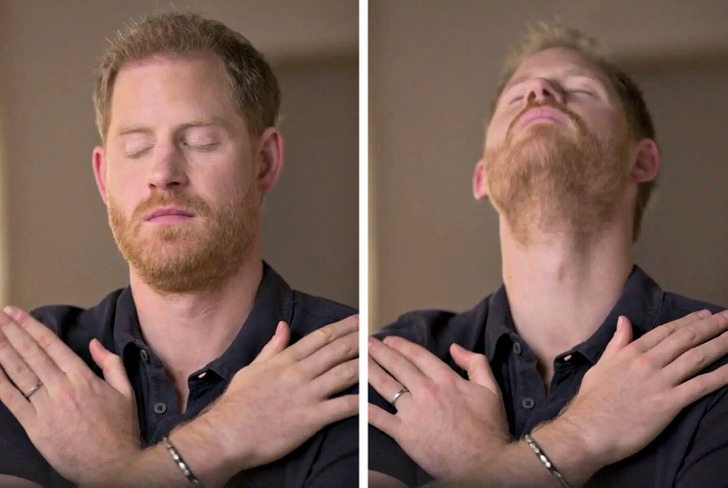
The therapy is called eye movement desensitization and reprocessing (EMDR) to address the debilitating effects of his anxiety attacks. This revelation offers a glimpse into the royal’s personal struggles and his proactive approach towards mental health care, shedding light on the significance of seeking innovative treatments of traumas.
In a video, Prince Harry can be seen undergoing EMDR therapy, where he taps his shoulders and moves his eyes rapidly. This therapy is relatively new and is used to treat PTSD. Prince Harry shared that he decided to try EMDR to deal with severe anxiety attacks he was experiencing.
Prince Harry mentioned that he was open to trying EMDR because of the therapy and work he had done over the years.
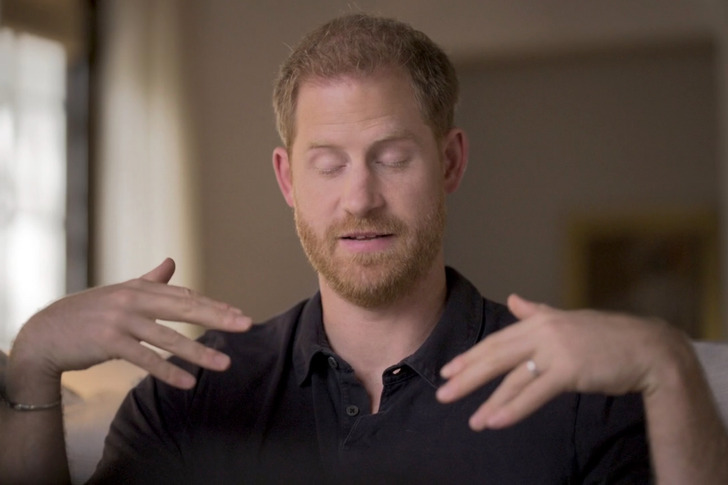
During a therapy session with UK-based psychotherapist Sanja Oakley, Prince Harry demonstrated how EMDR helped him feel better about returning home. He described feeling scared and helpless before, but the therapy helped him cope with those feelings.
Prince Harry’s openness about his experience with EMDR therapy sheds light on alternative treatments for post-traumatic disorder and mental health struggles. It shows that seeking help and trying different therapies can make a difference in managing mental health conditions.

EMDR is a therapy made in 1987 to help with emotional traumas. It’s a structured therapy where you think about a tough memory while moving your eyes back and forth. This helps lessen the strong feelings tied to the memory.
EMDR works on a theory called Adaptive Information Processing (AIP). It says that trauma sticks around because it hasn’t been dealt with properly. So, when something reminds you of the trauma, those memories can come back strongly.
Unlike other therapies that try to lessen your reaction to trauma, EMDR tries to change how your brain stores those tough memories. Sometimes, instead of eye movements, you might listen to alternating tones. Usually, EMDR happens once or twice a week for about six to 12 sessions. But it can vary depending on the person.
Benefits of EMDR therapy
- EMDR is a structured therapy and usually needs fewer sessions than ongoing therapies.
- You don’t have to keep going back to the tough memory for a long time.
- You don’t have to talk a lot about what happened to you.
- There’s no homework to do.
- EMDR doesn’t try to change your thoughts and beliefs.
Disadvantages of EMDR therapy
- While EMDR is known to help with PTSD, it hasn’t been studied as much for other mood or mental health problems.
- If you’re avoiding talking about a tough event, EMDR might not be the best choice. Other types of talk therapy might work better.
- EMDR can sometimes make you feel worse at the start of treatment. The person who created EMDR warns that this could be dangerous for people who have gone through really tough things.
The process of EMDR
EMDR is a structured process with eight phases, each aimed at helping you deal with traumatic memories:
- History taking: Discuss your past with the therapist to identify which memories to focus on.
- Preparation: Learn about EMDR and how the therapist will use bilateral stimulation.
- Assessment: Identify your negative and positive beliefs related to the trauma.
- Desensitization: Use bilateral stimulation while recalling the memory.
- Installation: Focus on positive beliefs while processing the memory.
- Body scan: Talk about how you feel emotionally and physically.
- Closure: Prepare for what may happen between sessions.
- Reevaluation: Assess your progress and decide if more sessions are needed.
As you go through EMDR, you may start feeling less overwhelmed by the trauma. It’s normal for other painful memories to surface, indicating that suppressed memories are being processed.
When grappling with deep emotional traumas, it’s crucial to seek out specialists who can provide the appropriate form of treatment tailored to your needs. Whether it’s EMDR therapy or other therapeutic approaches, finding the right professional can make a significant difference in your healing journey.
Preview photo credit Good Morning America / YouTube
15 Facts About “Harry Potter” That Even the Most Avid Fans Have Probably Missed
The world of Harry Potter is one of the most beloved franchises across several generations. The seven books covering the captivating story of young wizards, in total, sold more than 450 million copies, and the movies grossed more than $7 billion. A part of such great success has been the detailed work of all people involved which we, as fans, can admire infinitely.
We at Now I’ve Seen Everything wanted to dive deep into this magical universe and brought you our curious finds.
1. One might think that Aunt Petunia is cooking in this scene. But she is actually dyeing Dudley’s old clothes grey for Harry’s uniform. This is only ever mentioned in the first book.
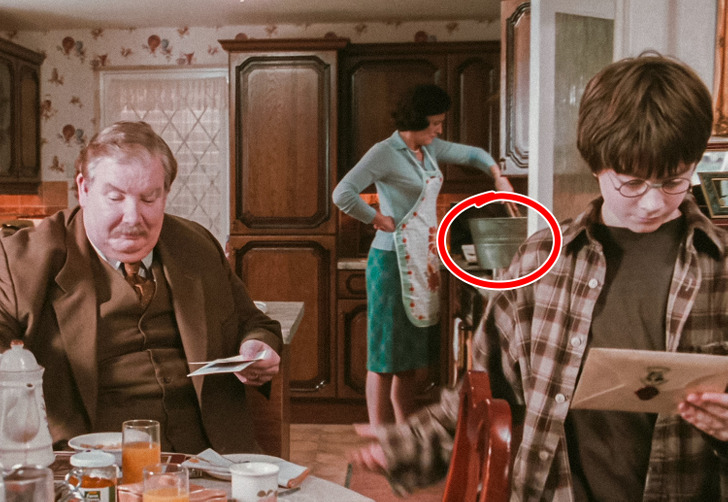
2. Number 7 on Harry’s Quidditch uniform
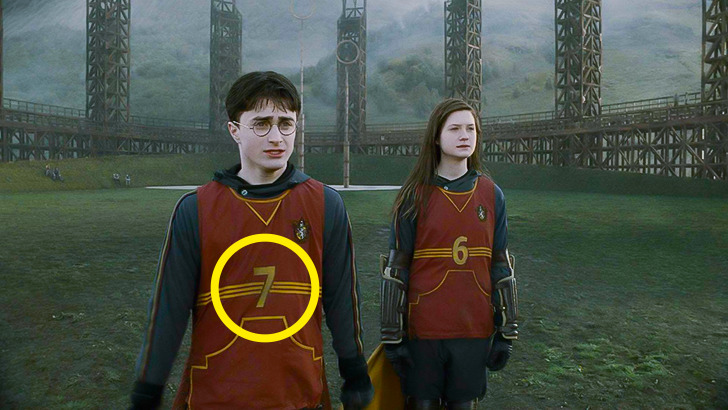
- Actually, the number 7 is a symbolic number in the world of JK Rowling. Moreover, Lord Voldemort has 7 Horcruxes and the last one, as we know, was Harry, which is quite symbolic too. However, the costume designer noted that the choice of this number for the Quidditch uniform is a reference to David Beckham, who played under this number a while back.
3. In the third movie, when Hermione appeared in class out of nowhere, we can actually see her time turner around her neck, which she hides in the next shot.
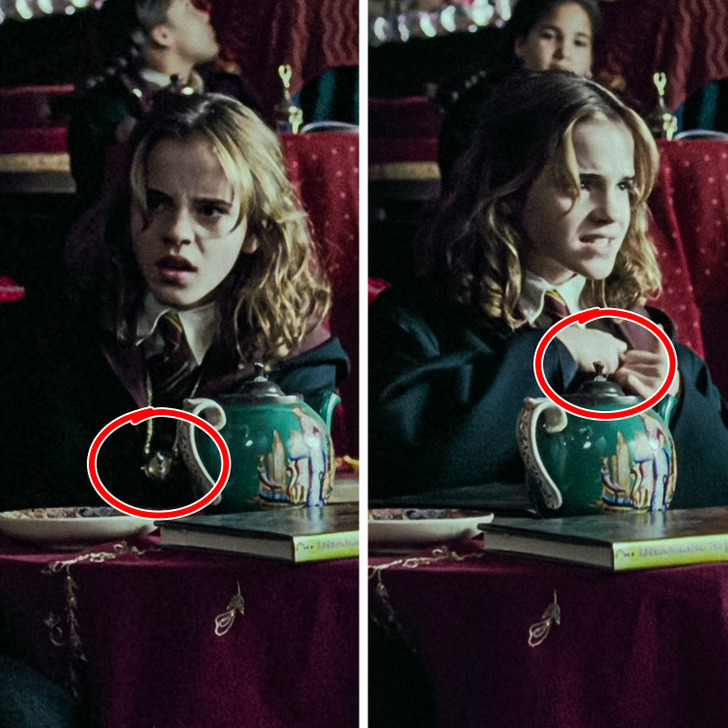
4. The scarves of Hermione, Ron, and Harry

- The costume designers decided to hint at the character of each person with the help of tiny detail — a scarf. If you’re paying attention, you know that each character ties it in their own way. Hermione tightens it as neatly as possible, according to the rules. Harry throws the end of the scarf over his shoulder. Ron doesn’t tie this accessory at all.
5. Although it may have gone unnoticed amidst all the chaos, in Harry Potter and the Deathly Hallows: Part 1 we get to see a reunion between Hermione and Viktor Krum.

6. As the story progresses and Harry and his friends begin to destroy the Horcruxes, you can see how Voldemort’s clothes become discolored, his eyes droop, and small lesions appear on his skin as a sign that he is getting weaker.
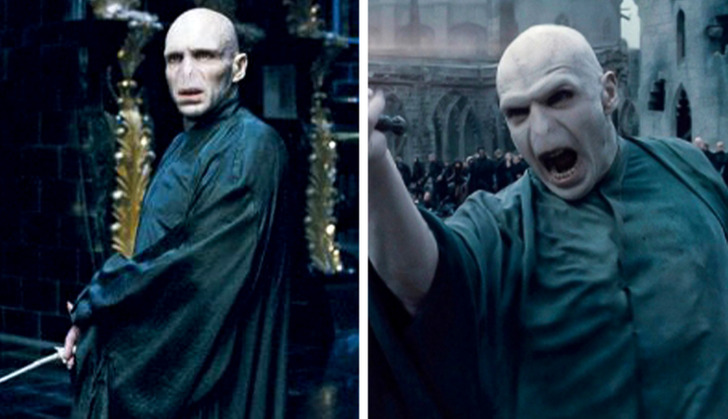
7. The changing costumes of Dolores Umbridge
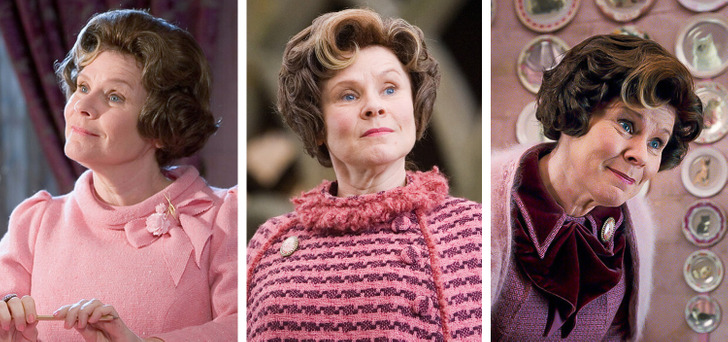
- In the image of Dolores, it was important to outline that she has power. We see that she, like many other powerful people, is rather conservative. For example, she wears the same hairdo and sticks to the same colors. Umbridge adores the color pink but its hues change as the plot develops.
- The costume designer commented on it in the following way, “I started with a lighter pink, and then as the film developed the pinks get hotter and hotter and hotter because she’s getting more and more hysterical.”
8. Harry’s scar
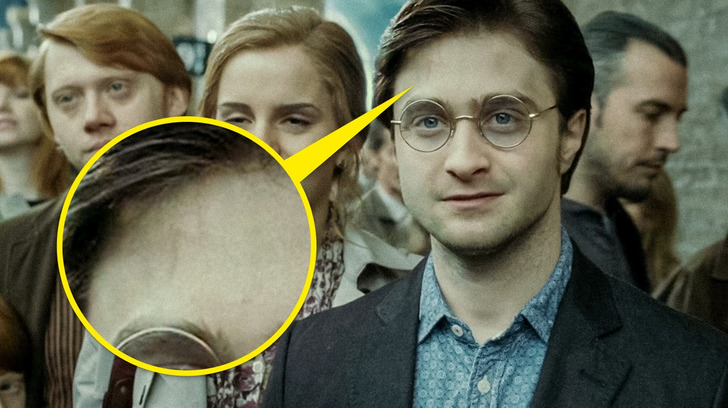
In the final shot of the film, Harry’s scar is noticeably faded and barely visible. It’s the reference to the last line of the novel series, “The scar had not pained Harry for 19 years. All was well.”
9. Ralph Fiennes (Lord Voldemort) asked for a hook to be added to Voldemort’s wand so that he could move more fluidly and “snake-like” without the wand falling from his hand.
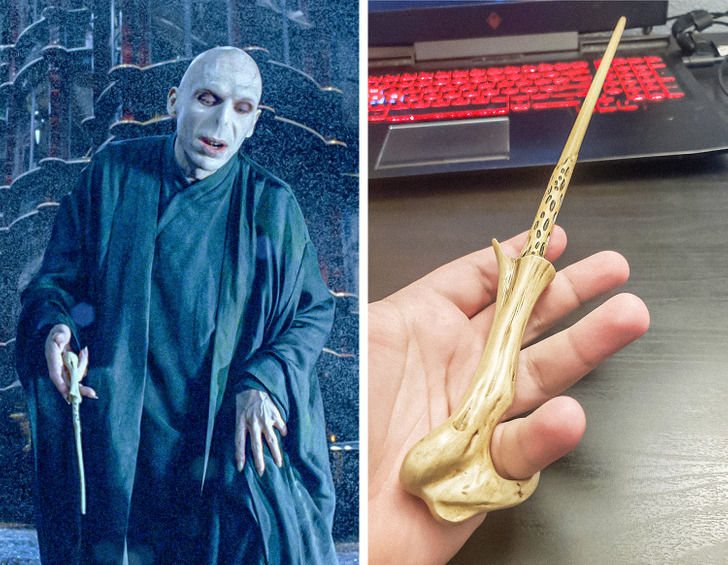
10. In the last movie, Lucius Malfoy is seen sporting a new tattoo on his neck. This is the prisoner number he was given when he entered Azkaban.

11. Gilderoy Lockhart’s wig
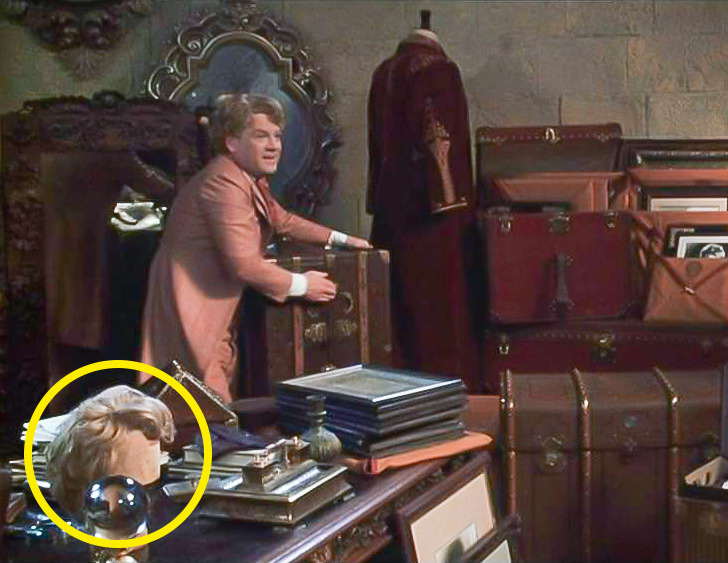
- In Harry Potter and the Chamber of Secrets, attentive viewers can notice that the professor of Defence against the Dark Arts, has a wig lying on his table. As we will later learn, Lockhart is a liar, who was cheating everyone and hadn’t done any feats. That is, he lies about everything and even his golden curls are fake.
12. Professor McGonagall has a secret talent.

- The Quidditch trophy from Harry Potter and the Sorcerers’ Stone not only features James Potter, Harry’s father but Professor McGonagall as well. Who would have guessed she was such a great player.
13. Hermione’s valuables.

- When Lockhart unleashes the pixies, Hermione immediately throws her books to the ground while no one else does because she knows the pixies will rip anything in plain sight apart.
14. Severus Snape and Gryffindor’s scarf
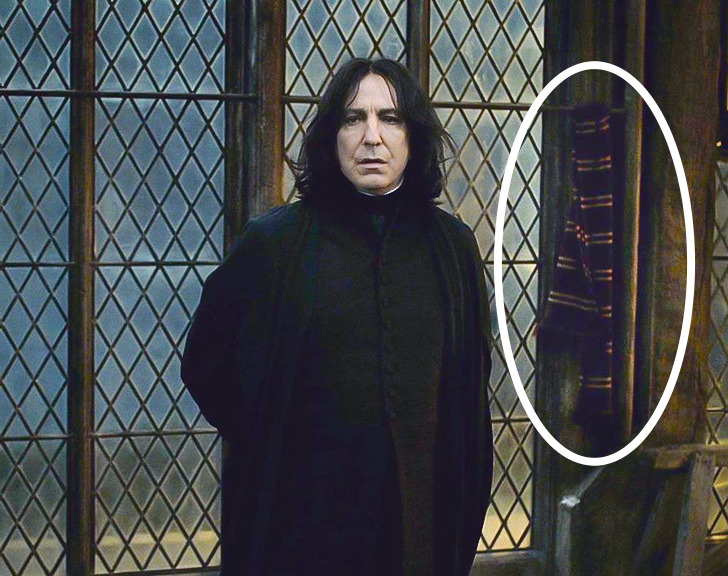
- Severus Snape is one of the most controversial characters. It’s not without reason that we see a striped scarf from Gryffindor hanging on the wall in the scene where he is killed. Perhaps he personifies the true inclination of Severus, and in due time he should have gone to Gryffindor, not to Slytherin.
- In the book, Dumbledore once says the following phrase relating to the distribution of students by faculty, “Sometimes I believe we sort too soon.” Perhaps, the professor was right. Perhaps, the scarf hanging in the closet is saying that people can change for the better.
15. As strange as it may seem, in Harry Potter and the Prisoner of Azkaban, a portrait of Voldemort can be seen on the side of the staircase.

What details in Harry Potter did you manage to notice only after re-watching or re-reading each one?
Preview photo credit Harry Potter and the Chamber of Secrets / Warner Bros. Pictures, Harry Potter and the Deathly Hallows: Part 1 / Warner Bros. Pictures



Leave a Reply